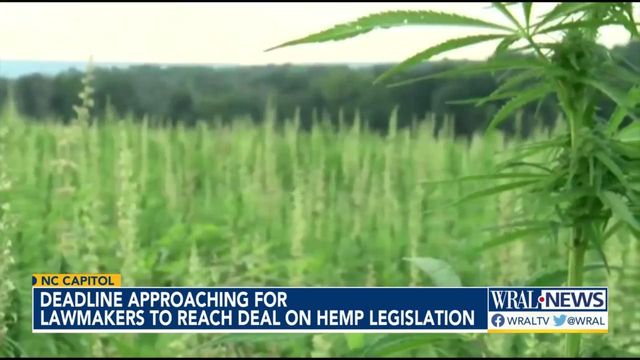'Not fair': As hemp deadline looms, hemp business owners fear going out of business
The House Agriculture committee is scheduled to hear the Senate's farm bill Wednesday. But sponsors have been told language related to the legalization of hemp will no longer be included in it.
Posted — UpdatedSean Parekh has worked in the hemp business since 2019 as the owner of Cannabliss Dispensary in Chapel Hill.
Next week, Parekh could be out of business if the legislature can’t come to an agreement this month to permanently legalize hemp.
“Everyone's already put way too much time, money, effort over the last four to five years and to have it go away—just not fair,” Parekh said. “Not fair to the state, not fair to business proprietors and not fair to our huge customer base.”
North Carolina first temporarily legalized hemp in 2015 to allow for an agricultural pilot project on industrial hemp. In the years since, it’s become a multimillion-dollar industry in the state.
The law that temporarily legalized hemp will expire June 30. If state lawmakers don’t extend it or make it permanent by then, the entire industry would become illegal overnight, and hemp growers and sellers could be subject to charges for possession and trafficking of marijuana.
Parekh called it a no-brainer to allow hemp to remain legal in North Carolina.
To become law, the same bill has to pass both chambers. So far, neither the House nor the Senate has taken up the other chamber’s legislation, even as the June 30 deadline grows closer.
The House Agriculture committee is scheduled to hear the Senate’s farm bill Wednesday. But sponsors have been told the hemp language will no longer be included in it.
GOP leaders have said some House Republicans are still opposed to legalizing hemp, so they’re reluctant to force a second vote on the issue. They said if the Senate would simply pass the House’s standalone legalization bill, it could be on Gov. Roy Cooper’s desk in an hour.
“People have their families to feed, people have medical needs as customers and consumers for this product,” Parekh said. “To have something where this becomes political, and … [there are] differences between the Senate and the House, it’s not the time for that.”
After an initial version of this article was published, Parekh said in a statement that he thought his business would ultimately survive, regardless of what happens in the legislature. “While we are pushing full steam ahead for these hemp farming laws to become permanent, our business as a retailer will be affected next to none at all,” he said in the statement.
Lawmakers supporting the bills say the impasse stems from a conflict between powerful veteran legislative leaders who play key roles in agriculture legislation.
Senate Agriculture Committee Chair Brent Jackson, R-Sampson, sent WRAL News a written statement about the June 30 deadline.
“The Senate unanimously passed a bill to address the looming deadline,” Jackson wrote. “Senate Bill 762 was the first Farm Act to pass unanimously. I’m hopeful the House will take up the bill and support our farmers.”
House Agriculture Committee Chair Jimmy Dixon, R-Duplin, didn’t immediately respond to a request for comment.
Sen. Mike Woodard, D-Durham, is one of the sponsors of the Senate’s Farm Bill. He says some House leaders are opposed to legalizing hemp and don’t want it in the Farm Bill, either.
“You know, anytime we put hemp in a piece of legislation, it raises concerns,” he said. “I think that's unfair. And I certainly think hemp is a viable agricultural and retail product in North Carolina.”
Woodard said he hopes his chamber can resolve differences with colleagues in the House for the benefit of business owners he’s been hearing from. “They’ve been watching this very closely and want to make sure that we can continue to have a viable industry once the pilot program ends next week,” he said.
• Credits
Copyright 2024 by Capitol Broadcasting Company. All rights reserved. This material may not be published, broadcast, rewritten or redistributed.






